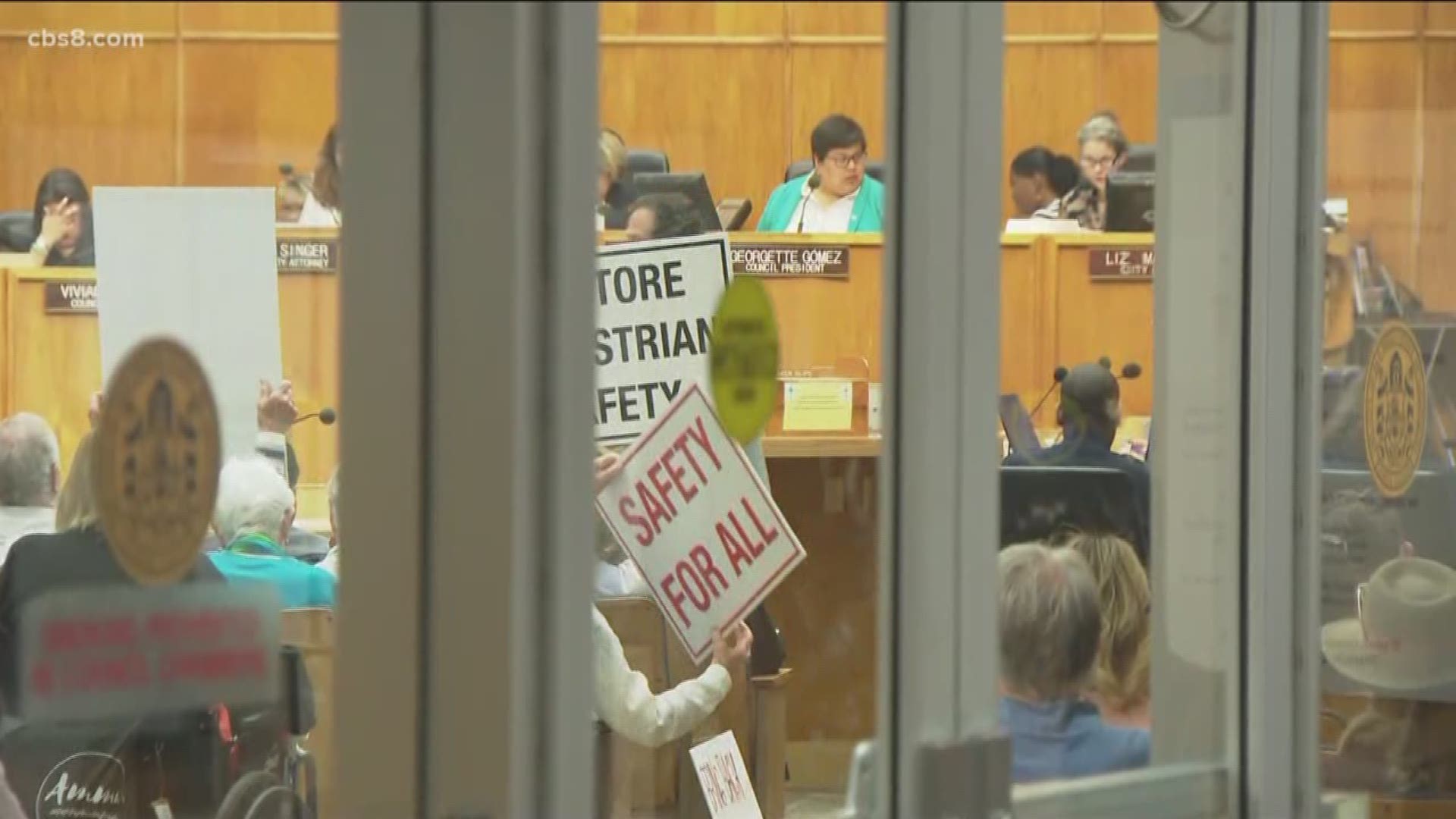SAN DIEGO — The San Diego City Council unanimously voted today to tentatively approve a regulatory package for dockless electric scooters, bicycles and the companies that own them.
The ordinance includes a litany of changes designed to improve public safety while also keeping dockless mobility companies in the region as an affordable transportation alternative. The city plans to use state grant funding to pay local law enforcement officers overtime to enforce the regulations.
The package will limit the speed of dockless scooters from 15 mph to 8 mph in high-traffic areas like Spanish Landing, near Petco Park and boardwalks in the city's beach communities, and as low as 3 mph along the Embarcadero and the Martin Luther King Jr. Promenade.
"At the end of the day this is a good starting point," said City Councilman Scott Sherman. "It's not going to be where we end up. ... The fact that both sides probably aren't totally happy with what is happening here today means we probably have a fairly good deal somewhere in the middle."
Scooter companies like Bird, Lime and Razor will be required to use geofencing technology on their scooters to limit speeds and parking abilities in designated areas around the city. Lime and Bird already use geofencing to reduce scooter speeds in areas like the Santa Monica Beach Bike Path.
The city has begun to designate 330 scooter parking zones along city streets so as to decrease the number of scooters parked on sidewalks. In downtown, scooter riders and companies will only be able to park devices in groups of four, with at least 40 feet between groups.
Many of the package's supporters were representatives of Bird, Lime, Razor and Jump, a dockless bicycle and scooter company owned by the ride- booking company Uber. The San Diego Regional Chamber of Commerce and public transit advocacy group Circulate San Diego also endorsed the ordinance.
"We look forward to a continued partnership and to regulations that advance our shared objectives of making the city even more livable by reducing car usage, traffic and carbon emissions," said Bird spokeswoman Kyndell Gaglio.
Most opponents of the package favored an outright ban of dockless transit devices throughout the city, let alone on the city's sidewalks. City Councilwoman Jennifer Campbell said she'd be one such opponent had she been on the council when they first arrived in San Diego early last year.
"I have a call to action to these companies that own these devices," Campbell said. "If they successfully obtain a permit, you must do your part to keep our residents safe with rider education and accountability and I will be watching."
Campbell and City Councilwoman Barbara Bry said they would support a future ban on riding dockless scooters along boardwalks in the city's beach neighborhoods, which city officials may draft in the coming weeks and months along with other changes to facets of the ordinance like which areas are designated 3 mph and 8 mph zones.
Some opponents also suggested that the council is responsible for residents' injuries and deaths due to scooter-related incidents.
The regulations include a provision indemnifying the city for scooter- related accidents and injuries. The scooter companies will also be required to maintain liability insurance of up to $2 million per accident and $4 million aggregate.
The city will require that scooter companies obtain a six-month operational permit with a $5,141 fee and pay $150 per scooter or bike each year to continue operating in San Diego. According to the city, revenue from the per- device fee will be added to the city's general fund to be used for scooter safety outreach, law enforcement and various transportation infrastructure improvements.
Companies can renew permits only in January or July, at which time they will have a chance to negotiate operating terms like fleet size, which they are not currently required to report to the city. Companies could also add a special event provision to their operating permit to increase fleet size by 20 percent for 10 days per year for $15 per scooter, per day.
Mayor Kevin Faulconer first proposed a regulatory framework for dockless scooters and bikes in October.
The council's Active Transportation and Infrastructure Committee unanimously approved the full regulatory package in February and requested that it return to the committee within six months of its implementation for further review and to ensure the city is keeping pace with the evolution of technologies like geofencing.
"The way people get around town has changed quite a bit and we're embracing that by putting in place common-sense rules to protect the quality of life in our neighborhoods," Faulconer said in a statement.
"These new regulations allow us to hold these companies accountable for their actions while establishing clear rules of the road to ensure this evolving industry grows in a safe and responsible way."
The council must vote on the ordinance a second time for it to take effect. A date has not been set for the second vote.

